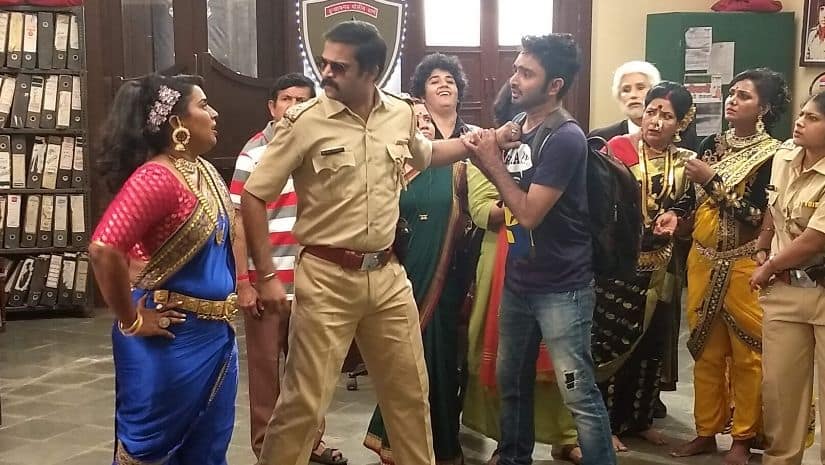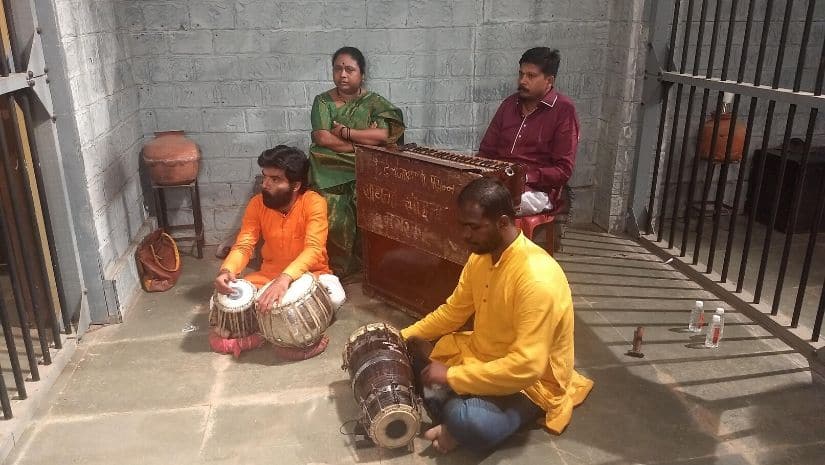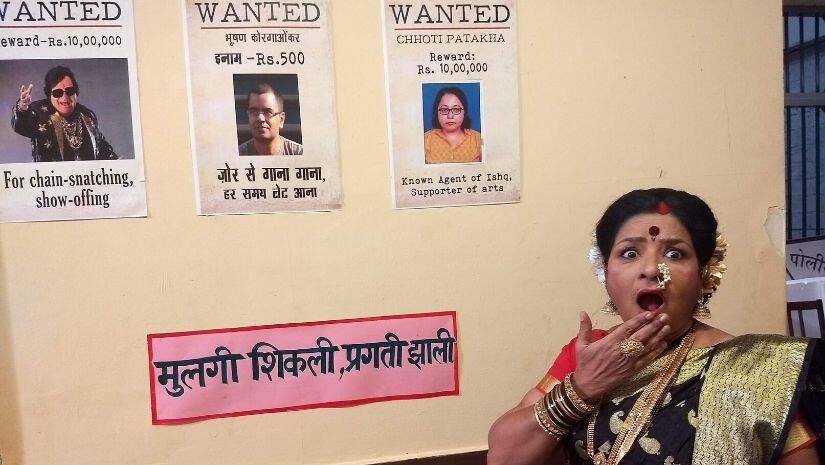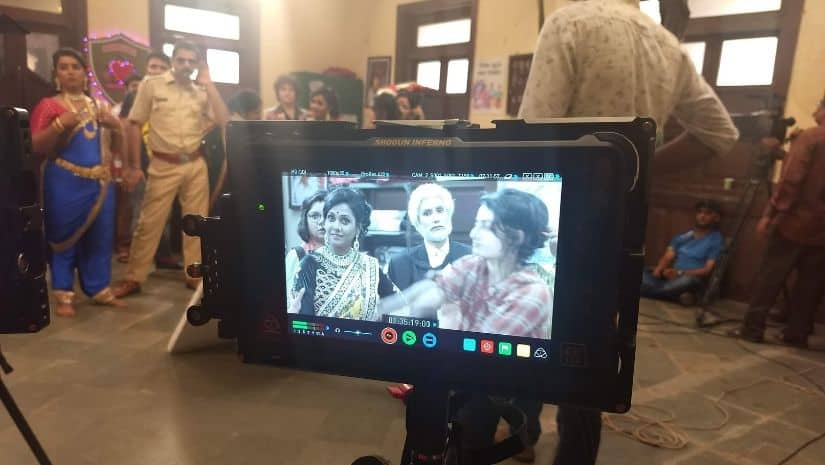The depiction of social issues through pop culture is often thought to merit a serious, sombre treatment, for fear that one may otherwise end up making light of the subject or be disrespectful. One such social issue is that of how police officials deal with women’s complaints about crimes such as domestic violence and harassment on the streets. As a departure from such notions, a new lavani video Aika to the Baika drives home the point in an entertaining and pleasurable manner. It is created by Agents of Ishq, a multimedia project that engages in conversations around gender, sexuality, desire and equality, in collaboration with Majlis, which operates as a feminist legal NGO. But this manner of depiction is not surprising or unexpected, if one is clued into the lavani performance art: Infamous for indulging only in themes like desire, sensuality, love and longing, lavani has in fact for centuries been employed as a tool for social messaging through a form that is referred to as the samajik lavani. Aika to the Baika is a modern iteration of the samajik lavani, a ’lyrical banter'.
It’s also not unexpected if one is familiar with the work of Paromita Vohra, the Creative Director of Agents of Ishq. She is of the opinion that ‘serious’ depictions may not always prompt people to examine their attitudes. “It becomes a kind of familiar ritual where everyone knows the right lip-service to pay, and everyone can look noble… But when we talk about a serious issue in a form like lavani, it’s unexpected. It’s a surprise and it does not allow you to just take a stock position. Instead, it invites you to watch a familiar issue with fresh attention and alertness," she explains. “Eroticism and intelligence are two petals of the same flower. We apprehend the world; make sense of the world through our senses. Lavani uses its pleasurable qualities to focus us on ourselves in relationship to the world,” she adds. Aika to the Baika, to be released on Women’s Day, follows Agents of Ishq’s 2016 project, The Amorous Adventures of Shakku and Megha in the Valley of Consent. A similar production, it laid out in a simple and uncomplicated manner, through a lavani, the meaning of consent: yes, no and maybe. [caption id=“attachment_8122021” align=“alignnone” width=“825”]  Artists on the sets of Aika to the Baika. Image courtesy Bhushan Korgaonkar[/caption] Majlis commissioned this video with an aim to utilise it for gender sensitisation during police trainings, as well as to have discussions with women about their rights. Bhushan Korgaonkar, the author of Sangeet Bari, has written the lyrics for Aika to the Baika with Savitri Medhatul. Previously, Korgaonkar and Medhatul turned Sangeet Bari into a stage production which celebrates the lavani tradition. “We (the duo and Vohra) had a meeting at Majlis with their lawyers and learnt about the problems women face at police stations while filing complaints. We were distressed after listening to accounts of horrifying situations,” says Korgaonkar. Korgaonkar’s process usually involves taking an existing lavani and employing its tune and metre as a framework, upon which new words and meanings are created. But while making Aika to the Baika, the author sat down with his team of musicians, his dholki and harmonium players, and the artist Shakuntala Nagarkar to compose an entirely new tune. Humming the song, Korgaonkar enacts a conversation between a girl and a police official: “Mazhi consent hoti,” (I gave my consent), says the girl “Tuzhya bapachi navti,” (But your father didn’t), the cop retorts “Mag lagna ka nahi kela,” (Why didn’t you marry), he asks “Tyachi garajch navti,” (That was not necessary) “Kuthe geli sanskriti,” (What about our values) “Ata mala kay mahiti” (That, I do not know about) [caption id=“attachment_8122011” align=“alignnone” width=“825”]  Musicians playing their part during the shoot of the lavani video that attempts to sensitise people towards addressing complaints around issues such as domestic abuse in a sympathetic manner. Image courtesy Bhushan Korgaonkar[/caption] As its refrain suggests, Aika to the Baika prompts the viewer to listen, to really listen to women. Vohra came up with the phrase which, although grammatically inaccurate in Marathi, serves its purpose, urging authorities and people alike to listen to women and shed their preconceived notions. Vohra consciously picked lavani as a medium for this project simply because it allows a point of entry into a grave issue without giving up on the pleasure of dance, and in the process, instead of just uttering phrases like ‘no means no’, one is able to actually talk about and discuss the nuances of concepts like consent.
“In other words, we created a discourse, not just a pat slogan,” she says.
As for the question of making a grave subject appear frivolous, she explains, “As a feminist filmmaker I don’t believe in these hierarchies and categories of what is inherently more or less serious. I believe that which is pleasurable can be and is serious, and that which puts on a serious face is sometimes rather superficial, just acting serious rather than being serious.” Also read: Lavani's lost glory: As art form's 'vulgarity' was condemned, its complexity, social messaging were ignored In using a humourous, notorious and utterly mesmerising dance form like lavani, Korgaonkar concedes that they realised they could not depict severe cases to produce a light-hearted video. “So we tried to find a middle ground,” he says, “and picked three issues: domestic abuse, eve teasing and conflicts that arise when a girl has already consented to a relationship but the parents object. For instance, a girl comes in with a domestic abuse complaint and the police tells her to ignore it, or try and understand the situation. They shout at her, terming it a ‘domestic’ problem that she should let go." In another case, a seemingly modern woman (her clothes indicate this) walks in to lodge a molestation complaint. The authorities have two approaches: first, about how she is to blame since she looks so ‘modern’, and second, if she is so ‘modern’ and ‘forward’, why can’t she handle the issue on her own instead of asking us for help? Concerns like these form the subject matter of Aika to the Baika. The emphasis remains on the abhinaya (expressions) of the lavani and the subtleties of the composition. Playing the parts of three different women caught in three different situations are artist Akanksha Kadam, well-known actor and dancer Megha Ghadge, and Shakuntala Nagarkar, long-time proponent of the lavani form and a recipient of the Sangeet Natak Akademi Award. [caption id=“attachment_8122031” align=“alignnone” width=“825”]  Artist extraordinaire Shakuntala Nagarkar on the sets of Aika to the Baika. Image courtesy Bhushan Korgaonkar[/caption] “There wasn’t a lot of dance in the production, just expressions and dialogue… We had been given one stanza each. Performing the abhinaya for a samajik lavani is not a joke,” Nagarkar emphasises, “Our abhinaya should be such that each and every member of the audience, including non-Marathi speakers, is able to understand the message.” She is of the opinion that for performances about social issues, the artist herself must be strong. “Samajik lavani is a medium to help bring about reform, and an artist must be equipped to bear that burden. It is not for the faint-hearted,” she says. While working on a shoot has its own merits, Nagarkar enjoys live performances more, as they give the performer an opportunity to completely let go and interact with the audience. [caption id=“attachment_8122061” align=“alignnone” width=“825”]  On the sets of Aika to the Baika. Image courtesy Bhushan Korgaonkar[/caption] Folk arts like lavani or batavani were more about the adakari and emoting the words of a song rather than dance, Nagarkar explains. With a mic in her hands and a smile on her face, a lavani artist can sing to the crowd and dance to the beats of the dholki with complete abandon for as long as ten minutes during a live performance. “But in a world where reality shows have gained popularity,” Nagarkar rues, “it is all over in two or three minutes, which is not enough time to play with the verses and unravel the subtle messages in a lavani.” However, with projects such as Aika to the Baika, age-old storytelling traditions are employed to address pertinent issues, in order to help change mindsets. Vohra says, “When it comes to attitudes, we need to use every cultural and media method available to us to change how people think. This requires us to have numerous points of view presented.” She adds that it is only by populating the cultural domain with many varied experiences and ways of storytelling or expressing emotions that we can actually hope to shift attitudes. “We must tell many, many more stories from the point of view of women, transform and queer people, Dalits and minorities and narrate many, many more experiences of these groups to create something like a balanced view of the world which is currently dominated by patriarchal, heteronormative and upper class/caste perspectives,” she explains.


)
)
)
)
)
)
)
)
)



